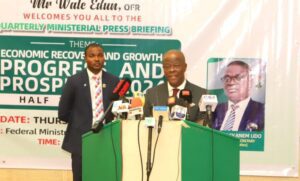
Inflation: Soaring food prices, diminishing purchasing power push Nigerians to brink
…Adverse climatic conditions, fuel hike, others remain cause of food inflation — AFAN Chairman
By Sodiq Adelakun
Nigeria is in the grip of a severe economic crisis after inflation rates rose to an alarming 26.72 percent following the latest statistics released by the National Bureau of Statistics (NBS) on Monday.
This has exacerbated the country’s economic woes, posing significant challenges for both the government and its citizens.
With prices skyrocketing and purchasing power diminishing, Nigeria is facing an uphill battle to stabilise its economy and alleviate the burden on its struggling population.
The impact of this inflation surge is being felt by ordinary Nigerians, who are finding it increasingly difficult to afford three square meals and other basic necessities.
Despite the government’s efforts to provide palliatives to cushion the effects of economic hardship, the headline inflation rate rose to 26.72 percent in September from 25.80 percent in August 2023.
This relentless increase in inflation is being driven primarily by food inflation, which has reached a staggering 30.64 percent. As a result, many families are struggling to put food on the table.
The NBS has identified several factors contributing to the soaring food inflation.
The situation is dire, and urgent action is needed to address the root causes of this economic crisis. The government must take bold steps to stabilise the economy and provide relief to its citizens.
The prices of oil and fat, bread and cereals, potatoes, yam and other tubers, fish, fruit, meat, vegetables, and milk, cheese, and eggs have all experienced significant increases.
These price hikes have been attributed to various factors, including supply chain disruptions, rising production costs, and the depreciation of the national currency.
The Nigerian government has implemented various measures to address the economic crisis and mitigate the impact on its citizens. However, these efforts have not been sufficient to curb the rising inflation. The government’s palliatives, aimed at providing relief to vulnerable populations, have fallen short in the face of skyrocketing prices.
As a result, many Nigerians are left struggling to make ends meet, with their purchasing power diminishing rapidly.
Stabilising Nigeria’s economy and alleviating the burden on its struggling population will require a multi-faceted approach.
Additionally, there is a need for targeted social welfare programs that provide direct support to the most vulnerable segments of society.
Nigeria’s deepening economic crisis, characterised by soaring inflation rates, has pushed the country to the brink. The burden falls heavily on the shoulders of ordinary Nigerians, who are struggling to afford basic necessities.
According to the bureau, the decline in food inflation on a Month-on-Month basis was caused by a fall in the rate of increase in the average prices of potatoes, yam and other tubers, bread and cereals, fruits, and fish.
“The average annual rate of Food inflation for the twelve months ending September 2023 over the previous twelve-month average was 25.65 per cent, which was a 6.29 per cent points increase from the average annual rate of change recorded in September 2022 (19.36 per cent),” it said.
With an already struggling Nigerian economy, the development indicates more misery for Africa’s largest economy, with over 200 million people.
Rising inflation, debt management and a forex crisis are headaches for the barely four-months-old administration of President Bola Ahmed Tinubu.
The Minister of Finance and Coordinating Minister of the Economy, Wale Edun and the new Governor of the Central Bank of Nigeria, Olayemi Cardoso, certainly have a lot of work to do on the country’s economy to halt an impending poverty crisis.
In an interview with Nigerian NewsDirect, the Chairman, All Farmers Association of Nigeria (AFAN), Lagos State Chapter and South-West Zone, Dr Femi Oke identified food inflation as a global issue as far as Nigeria is concerned.
Dr Oke highlighted that the increase in fuel prices is also contributing to food insecurity.
He emphasised that despite the transportation costs involved, farmers are still determined to bring their produce to market.
Additionally, Dr Oke mentioned that farmers face challenges such as adverse climatic conditions, including flooding.
When pointing out the challenges faced by farmers, he said: “The climatic condition, Flooding is also one of the problems faced by farmers.
“The climate change also affects farmers, when crops are destroyed, everything will be gone.
“The challenges are so enormous, the losses of harvest are also there. With those issues, prices of commodities.”
He appreciated President Bola Ahmed Tinubu for introducing food security into his government and for the advancement of name from federal ministry of Agriculture and Rural Development to Ministry of Agriculture and Food security.
“We decided to bring a blueprint by introducing technology, mechanism, area of banditry is one of the areas that must be tackled, farmers should create hub.
“Former President was able to sign a bill on the foundation for the farmers, so that farmers don’t go to the commercial bank to annex money.
“Extension officers must be strengthened, have training for farmers in the bank, they must act like parastatals.”



